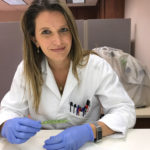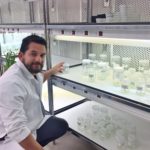Latest crop improvement technology coming to Texas A&M AgriLife
Writer: Kay Ledbetter, 806-677-5608, skledbetter@ag.tamu.edu
Contact: Dr. Charlie Johnson, 979-862-3287, Charlie@ag.tamu.edu
Dr. Michael Thomson, 979-845-7526, m.thomson@tamu.edu
Marco Molina, 979-458-1410, marco.molina@tamu.edu
Mayra Molina, 979-458-1410, mayrafmolina@tamu.edu
Contact: Dr. Charlie Johnson, 979-862-3287, Charlie@ag.tamu.edu
Dr. Michael Thomson, 979-845-7526, m.thomson@tamu.edu
Marco Molina, 979-458-1410, marco.molina@tamu.edu
Mayra Molina, 979-458-1410, mayrafmolina@tamu.edu
COLLEGE STATION – Texas A&M AgriLife Research is investing in the future of rapid crop design with improved traits through the deployment of two new labs and a half-million dollar seed grant program to jump-start the process.
“We are pleased to announce a new funding opportunity that focuses on building a pipeline for genome editing in agriculturally important crops in Texas and beyond,” said Dr. Bill McCutchen, executive associate director of AgriLife Research, College Station.

Dr. Charlie Johnson, director of the Genomics and Bioinformatics Service Lab, College Station. (Texas A&M AgriLife photo)
“The recent development of the Crop Genome Editing Lab and the MultiCrop Transformation Lab, coupled with the existing capabilities of the Genomics and Bioinformatics Service Lab, uniquely positions us to research and discover novel methods and solutions for important traits across multiple crops,” McCutchen said.
Together, these research and service labs, combined with one of the largest agriculture-focused sequencing facilities in the world, can now provide a complete plant genome editing pipeline for crop improvement, said Dr. Charlie Johnson, director of the Genomics and Bioinformatics Service Lab, College Station.

Dr. Michael Thomson, Texas A&M Univeristy professor and HM Beachell Rice Chair with AgriLife Research. (Texas A&M AgriLife photo)
The Crop Genome Editing Lab is led by Dr. Michael Thomson, Texas A&M University professor and HM Beachell Rice Chair with AgriLife Research, while the MultiCrop Transformation Lab is directed by research specialists Marco and Mayra Molina.
“We believe our 25-plus years combined experience working on plant biotechnology, either on academia or industry will fully support AgriLife’s initiative of building this pipeline aimed at successful plant transformation of major commercial crops and overcoming challenges such as stable transformation and plant regeneration,” the Molina’s said in a joint statement.

Mayra Molina, research specialist, will lead the MultiCrop Transformation Lab in College Statiion with her husband Marco Molina. (Texas A&M AgriLife photo)
Some of the newest capabilities include genomics analysis for single guide RNA design, Cas9/sgRNA construct development, biolistic or Agrobacterium-based transformation, plant regeneration and confirmation of gene-edited progeny.
Thomson said by working with individual research and breeding groups, their combined expertise can help jump-start genome editing activities for crop improvement.
The seed grant program will fund approximately 20 projects focused on a specific crop, trait and target gene or genes, with each project allowed to request up to $30,000 in service credits for the entire project, he said.

Marco Molina, research specialist, will lead the MultiCrop Transformation Lab in College Station with his wife Mayra Molina. (Texas A&M AgriLife photo)
The seed grant program aims to link investigators with this integrated genome-editing pipeline to test genome editing approaches for their target crop and trait.
“We are now utilizing CRISPR/Cas9 genome editing, which has transformed research approaches across a wide range of fields,” Thomson said. “This method presents an unprecedented opportunity to rapidly deploy beneficial traits in major crops, thus cutting time off the long breeding process.”
While genome editing offers tremendous promise, Thomson said there are still a number of challenges to be tackled before the technology becomes routinely used for crop improvement.
Some of the issues for researchers will be:
– Knowing the gene or genes underlying the trait of interest.
– Targeting multigene families or genes in polyploid species.
– Moving beyond simple knock-outs to implement precise base edits and allele replacements.
– Avoiding off-target effects.
– Overcoming genotype-specific transformation.
– Regeneration constraints.
– Efficiently selecting progeny with the desired edits.
“We have this technology and we are open for business,” Johnson said. “This is part of AgriLife Research’s continued investment into agriculture and life science platforms and providing the latest technology and corresponding seed grants to our faculty.”
-30-

No comments:
Post a Comment